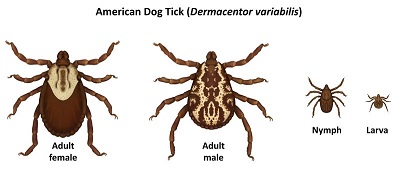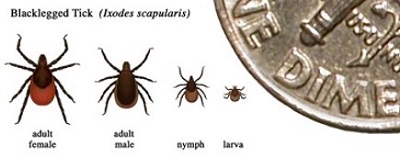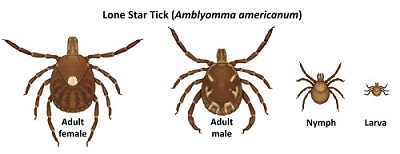 What diseases do ticks transmit?
What diseases do ticks transmit?
In Ohio, there are several diseases that are of concern: Lyme disease, Rocky Mountain spotted fever, Anaplasmosis and Ehrlichiosis. If you suspect you might have a tick transmitted disease, please seek immediate medical attention.
Information about Lyme Disease in Ohio
 How do I remove a tick?
How do I remove a tick?
If a tick is attached to you, please take the following steps to remove it from your body.
CDC Guidance for Tick Removal and Self Check for Ticks
 Can ticks be tested for disease?
Can ticks be tested for disease?
Some people are interested in having ticks that they removed from themselves, loved ones or pets tested for various tickborne diseases. The Ohio Department of Health does not recommend tick testing under these circumstances for the following reasons:
- You may not have been infected. Even if a tick is infected and tests positive, it may not have transmitted the infection to you.
- It might delay treatment. Tick test results take several days and may not be available in time to make a prompt healthcare decision.
- You may have other tick bites that you don't know about. Most people who are infected with tickborne diseases do not recall a tick bite. Therefore, if someone were to develop symptoms of tickborne disease, there would be no way to know whether the infection was from a known tick bite or another unknown tick bite. For example, if a tick is tested and the result is negative, you could still have been bitten by another infected tick, not know it, and develop symptoms of tickborne disease.
- Tests performed on ticks are not always perfect. All laboratory tests have the possibility of false positive or false negative results. Even with a negative result, people should still monitor themselves for the appearance of a rash, fever, and other flu-like symptoms. If any of these symptoms occur, you should contact your healthcare provider.
Some private laboratories offer tick testing, but the Summit County Public Health (SCPH) does not collect ticks from the public and test them for tickborne diseases.
Can ticks be identified?
Yes, SCPH will provide tick identification for residents of Summit County for ticks that were found on or attached to humans or pets. Once the tick species is identified, we can advise what diseases are associated with that particular tick. Testing of the ticks for the presence of diseases is not a service we are able to provide. In order to have a tick identified, please take the following steps:
- The tick must be removed from the person. SCPH will not remove a tick from someone’s body; please take the following steps to remove it. Please seek medical attention if unable to remove the tick.
- We will not pick up ticks.
- Please call 330-926-5600 to schedule a drop off or to submit pictures.
- SCPH will identify the tick within 1-2 business days.
- Keep the tick! We may reach out to you with additional questions if we are having difficulty identifying the tick. You can place the tick in a small, air-tight container, such as a pill bottle or baby food jar, with a few drops of rubbing alcohol to preserve it.
If you have any medical concerns, please discuss the situation with a doctor. They should explain and advise you on the signs and symptoms of tick-borne diseases.
Ticks and Pets
- Keep your pet up to date on their tick prevention medication.
- Check pets regularly for ticks if they have been out doors.
- Keep grass mowed to reduce tick habitat in your yard or keep pets out of tick habitat areas.
- Dogs can be vaccinated against Lyme disease. Talk with your veterinarian to see if the vaccine is a good fit for your dog.
If you are concerned that your pet might have a tickborne disease talk to your veterinarian.
Tick images from Ohio Department of Health.
page updated 03/28/2024
